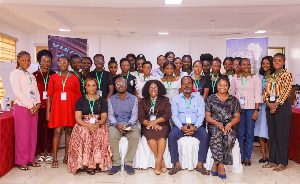It is an undeniable fact that resource-rich economies on the continent of Africa have not been able to harness the full opportunities the extractive sector for the much-needed socio-economic transformation. After centuries of mineral exploration, Africa, one of the most endowed continents in terms of natural minerals deposits, has very little to show for it. Indeed, the much-researched case of ‘resource-curse’, is mostly cited from the continent.
It continues to puzzle the development world how a natural resource-dense continent can be so impoverished after centuries of exploiting its natural resources. Whereas the root causes of this development tragedy in Africa have been widely been diagnosed by various interest groups and researchers, one major cause that has to do with the lack of local capacity in managing the exploration and use of Africa’s natural resources is of particular concern to the Good Governance Africa (GGA).
One would have imagined that after centuries of giving commercial licenses for the exploration of Africa’s rich natural resources including gold, bauxite, diamonds, aluminum, manganese and lithium, just to mention a few, there will exist significant local human resource capacities to manage the extraction processes. Yet to date, all the major mining firms on the continent are either owned or managed by foreigners.
Whilst a major factor of the situation revolves around the lack of adequate local investment for the sector, the limitation in terms of local human capacities to manage the exploration, is denying Africa enough income from the mines. There is therefore, the urgent need for African nations with significant mineral exploration projects to ramp up investment in their local human resource capacities in the extractive sector. This change will ensure the creation of job opportunities for the youth and help retain resources in the countries.
GGA West African Regional Office (GGA-WARO) has been investigating the challenges in the extractive sector for the past seven years now and has found out significant gaps in terms of the opportunities the sector creates for indigenes and the economies of the affected nations at large. In Ghana, Sierra Leone and Liberia for instance, there is the bulging youth populations in the mine-take communities.
Opportunities created by the mining firms in these communities are, however, limited and the expected qualifications for the few job slots often beyond the capacities of the youth. The governments (both central and local) must build the capacities of the youth through formal and informal education and skills development. to help bridge this gap and create awareness for the various stakeholder interventions, GGA-WARO continuous to offer capacity building for identifiable youth groups within Ghana and in future in the other three English-speaking West African countries (Sierra Leone, Liberia and The Gambia) under its jurisdiction.
This very session of the human resource capacity building initiative for the youth in mine-take areas in Ghana, is targeted at young pre-tertiary female students in the Western Region of Ghana. The Western Region of Ghana is one of the most natural resources endowed administrative regions in the country. The region boasts of large deposits of bauxite, gold, manganese and crude oil. Its capital city, Takoradi, is home to the country’s second largest port, which is used for the export of these natural resource commodities.
Objective of the training session
GGA-WARO through this capacity initiate is seeking to enlighten young and coming female students within the Western Region of the opportunities for employment within the burgeoning extractive sector in the Region.
Rationale
Most often, the courses and programs that gives professional training to the human resource needed by the mining firms (including oil production), are dominated by males. In an effort to encourage the female population to venture into these fields, GGA-WARO is actively designing and implementing well-targeted programs for girls in the sciences and technological fields as well as other in-demand programs. These efforts are geared towards bridging the equity gap between boys and girls and in effect help address the issue of marginalization of women.
Expected impact
- Well-enlightened female students on the career opportunities in the mining sector
- Well-informed students and teaching staff on the courses that will lead students to build careers in the available mining fields
- An increased uptake of female students in courses that will lead them to land jobs in the extractive sector in future
- Potential increase in local human resource capacities in the mine-take areas with a competitive edge for female graduands
Opinions of Thursday, 29 August 2024
Columnist: Good Governance Africa







![NPP Flagbearer, Dr. Mahamudu Bawumia [L] and NDC Flagbearer John Mahama NPP Flagbearer, Dr. Mahamudu Bawumia [L] and NDC Flagbearer John Mahama](https://cdn.ghanaweb.com/imagelib/pics/869/86902869.295.jpg)











